MercoPress. South Atlantic News Agency
Human rights violations and environmental disasters: What leaves the Chinese investment in Latin America
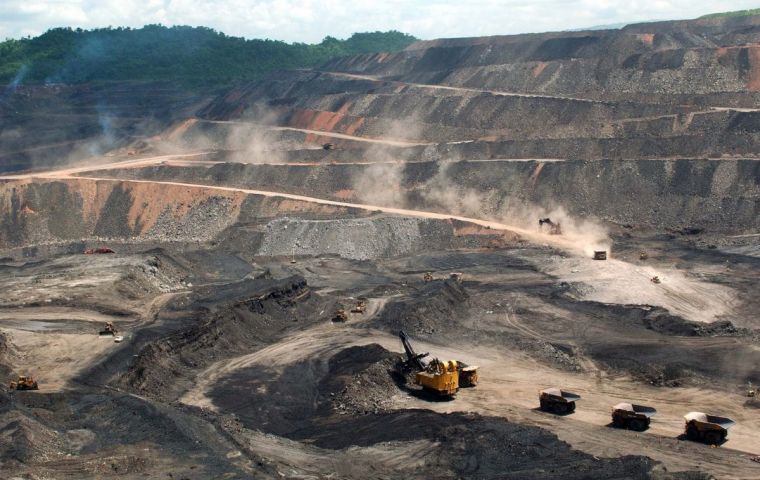 “Our States are favoring Chinese companies, to which the sovereignty of our natural heritage is being delivered,” says Chocaiza.
“Our States are favoring Chinese companies, to which the sovereignty of our natural heritage is being delivered,” says Chocaiza. 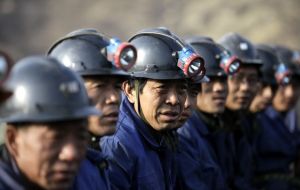 Being accomplices of the problem, Latin American states such as the Bolivian have imposed oil exploration projects such as the oil block Nueva Esperanza
Being accomplices of the problem, Latin American states such as the Bolivian have imposed oil exploration projects such as the oil block Nueva Esperanza 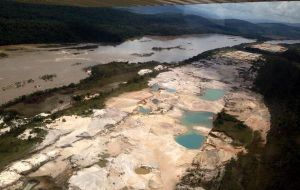 In Venezuela, the pollution generated by illegal mining in Canaima National Park has probably destroyed thousands of hectares of protected areas. (Valentina Quintero)
In Venezuela, the pollution generated by illegal mining in Canaima National Park has probably destroyed thousands of hectares of protected areas. (Valentina Quintero) 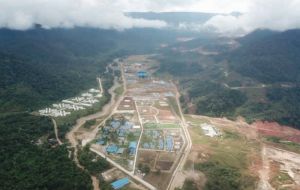 The Ecuador region where the Mirador project is developed represents a unique ecosystem due to its biodiversity and is home to several Kichwa and Shuar indigenous communities.
The Ecuador region where the Mirador project is developed represents a unique ecosystem due to its biodiversity and is home to several Kichwa and Shuar indigenous communities. 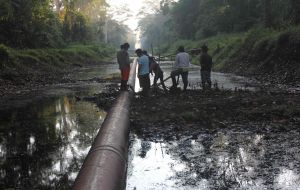 Chinese companies such as BGP are unaware of the agreements and cause environmental damage affecting the livelihoods of local communities
Chinese companies such as BGP are unaware of the agreements and cause environmental damage affecting the livelihoods of local communities 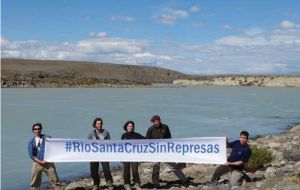 In Argentina, the Chinese construction company China Gezhouba Group Corporation (CGGC) progresses without authorization a hydroelectric complex after being disallowed by the Supreme Court of Justice
In Argentina, the Chinese construction company China Gezhouba Group Corporation (CGGC) progresses without authorization a hydroelectric complex after being disallowed by the Supreme Court of Justice Chinese companies present a pattern of violations of human and environmental rights in Latin America, according to a report revealed by the International Federation of Human Rights (FIDH).
Together with various social organizations from Ecuador, Bolivia, Peru, Argentina and Brazil, FIDH has produced a shadow report that reveals human rights and environmental abuses by Chinese mining and oil corporations with the complicity of the states of the region.
The report, entitled Evaluation of the Extraterritorial Obligations of the People’s Republic of China: Case Studies from Argentina, Bolivia, Brazil, Ecuador and Peru, denounces some “knowingly violating behaviors” and the lack of willpower of the Asian State for monitoring and enforcing the minimum standards required by its companies and banks.
On November 6, China will be examined by the United Nations in the framework of the third cycle of the Universal Periodic Review (UPR), an initiative that motivates to investigate and support the protection of human rights created together with the UN Human Rights Council. (HRC) in 2006.
For the NGO, almost half a century ago few could have guessed that today, a crucial struggle for Latin American peoples would be the defense of their economic, social, cultural and environmental rights against the irrational development and exploitation of natural resources; and that China was precisely a representative of these threats.
The report documents the Chinese state's failure to comply with its ex-traterritorial human rights obligations for at least 18 projects operated by 15 Chinese business consortiums, which have acted with the support of 6 Chinese banks in Argentina, Brazil, Bolivia, Ecuador and Peru.
In Ecuador, the open-pit mega-mining projects of Mirador and San Carlos Panantza are being developed in Cordillera del Cóndor, in the Ecuadorian Amazon. The region represents a unique ecosystem for its biodiversity and the home of several indigenous Kichwa and Shuar communities. The report denounces that these projects are highlighted by the limited diffusion of the Environmental Impact Studies (EIA) and by acting with an exclusionary and discretional attitude, by not directing information to the entire affected population.
Consulted by MercoPress, the director of the Ecuadorian environmental NGO Acción Ecológica and member of the Observatory of Mining Conflicts in Latin America (OCMAL), Gloria Chicaiza, reports on the short and long term consequences of the impacts of the Chinese extractivism to the sustainable development, stating that ”it is within sight (of everyone) the damages that are being done in Ecuador. For example, through public utility figures, the communities surrounding the Mirador project have been dispossessed of land or communities have been invaded like Indigenous people Nankintz to replace them for the mining camp in the hands of the Chinese companies Tongling group and CRCC.”
Indeed, the consortium between the Chinese companies Tongling Nonferrous Metals Group Holdings C.o., Ltda and China Railway Construction Corporation Limitel grant capital to the mining company Ecuacorriente S.A. (ECSA), in charge of the Mirador project.
However, the Chinese news agency Xinhua said in August that the project is outside protected areas and ancestral territories, complying with the Mining Law of Ecuador, the president of the mining company said, Hu Jiandong.
Being accomplices of the problem, Latin American states such as Bolivia have imposed oil exploration projects such as the oil block Nueva Esperanza, which overlaps with one of the three territories of the Tacana indigenous people. In this territory lives an indigenous people in a condition of voluntary isolation, the “Toromona”.
Although the Tacana opposed the state exploration, in 2013 the Bolivian State won and reached an agreement with the oil companies BGP Bolivia, subsidiary of BGP Inc. and the state company China National Petroleum Corporation (CNPC), in charge of exploration, to safeguard the territory and protect the Tacana and Toromona peoples.
However, BGP ignored the agreements and caused environmental damage affecting their livelihoods, according to the FIDH report.
Chocaiza also indicates that “our states are favoring Chinese companies, to which the sovereignty of our natural heritage is being delivered, while we as a region will be left with territories destroyed, displaced populations, impoverished, indebtedness anchored to the delivery of minerals to China, and no one believes that mining in general and less the Chinese in particular contribution to development.
Her NGO, Acción Ecológica, filed a lawsuit in 2015 against the Ecuadorian State for violating the rights of nature and another for ”lack of consultation“. However, any trial against the administration of former President Rafael Correa was lost.
Acción Ecológica alleges that, in Latin America, there is evidence of a displacement of the traditional relations that have been maintained as a South American and Caribbean continent relative to the North American power historically. China is the main developed country that has contributed to change the unipolar world controlled by the United States. However, the battle for international trade generated this year by the protectionist models of both powers have begun to revolutionize the face of the world trade model.
”The World Health Organization already recognizes that mining is among the most polluting activities on the planet: it is harmful to the environment, destroys forests and biodiversity, alters ecosystems, pollutes water, air and land, affecting the local populations, and their ways of life and sustenance,” recalls Chocaiza.
Currently, the Ecuadorian NGO is promoting an audit of mining projects through the Office of the Comptroller of the Nation of Ecuador.
In the projects of Mirador and San Carlos Panantza, Chinese mining companies have resorted to questionable practices in the acquisition of the lands with the complicity of the Ecuadorian State through their support of the public force to forcefully evict after the irregular purchase and without consultation; arbitrary demands of mining easements or the interposition of civil lawsuits against families without property titles. These practices have led to at least the forced eviction and involuntary displacement of at least 42 indigenous families in the region.
For its part in Argentina, on December 21, 2016, the Supreme Court of Justice of the Nation suspended the construction of the Dams of the Cóndor Cliff - Barrancosa Hydroelectric Complex on the Santa Cruz River, until the evacuation was properly carried out and approved. of environmental impact of construction. The project built by the Business Transitional Union, integrated by the Chinese construction company China Gezhouba Group Corporati-on (CGGC) and other Argentine companies, advances without consultation “in its phase of complementary works”, as indicated by the affected indigenous communities for the project, in-halters by Lof Fem Mapu.
The Council of Economic and Social Rights of the United Nations (CESCR) confirmed in its General Observations that the obligations of States are applied “outside the national territory in situations over which the States Parties exercise control” and ruled on the need to take “necessary measures to prevent violations of human rights abroad by corporations domiciled in its territory and / or jurisdiction”.
China has also recognized its obligation to respect human rights instruments in its operations outside of China when in October 2017 the Ministry of Commerce and the National Reform and Development Commission of that country issued a guide in which Chinese entities and individuals who participate in economic activities abroad must “respect the laws of the host country, the UN resolutions, and protect the good image of China.”
Civil society in Latin America has a long tradition of participation in the definition of development policies and large-scale projects; However, the spaces for national participation have been undermined by a secretive and exclusionary model that has been generated around Chinese investments. Local communities and civil society organizations frequently report the impossibility of knowing basic information about the projects that affect them, and even communicating with the Chinese institutions that materialize them.
FIDH understands that the viability of “mutually beneficial relations between China and Latin America depend in large part on China having a genuine commitment to the well-being of local communities, and with a model of investment that respects human rights and of nature.”
Already in Venezuela, the pollution generated by illegal mining in Canaima National Park, decreed a World Heritage Site by UNESCO, has probably caused thousands of hectares of virgin forest to be destroyed in full view of the Armed Forces of that country, which control the mining activity in Venezuela, a country whose government has a recent history of strong patronage with China. The mining concessions to this country due to Venezuela's credit debts have given it free rein for Chinese mining companies to settle in this country in a less transparent manner than elsewhere in Latin America, causing environmental outrages like the one documented last Tuesday by the journalist Valentina Quintero.
The Third Cycle of China's UPR represents a unique opportunity for China to listen to the voices of local communities, review the behavior of her businesses and finances and put in place the necessary procedures and tools to repair past damages and prevent further costs for the planet and its communities.
Sebastián Astorga - Montevideo




Top Comments
Disclaimer & comment rulesCommenting for this story is now closed.
If you have a Facebook account, become a fan and comment on our Facebook Page!